A Hmong girl in a Thai refugee camp learns to embroider the pa’ndau or story cloth from her grandmother to tell the story of her life.
Refugee camp
When Stars Are Scattered
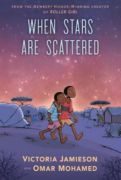
Omar and his younger brother Hassan live in a refugee camp, and when an opportunity for Omar to get an education comes along, he must decide between going to school every day or caring for his nonverbal brother in this intimate and touching portrayal of family and daily life in a refugee camp.
Featured in WOW Review Volume XIII, Issue 1.
When Stars are Scattered is featured in A Dozen Books Celebrating Children’s Voices and Their Impact.
Children Growing Up With War
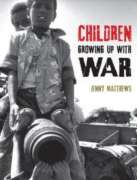
The right to adequate nutrition and medical care.
The right to free education.
The right to a name and nationality.
The right to affection, love, and understanding.
In conflict zones around the world, children are denied these and other basic rights. Follow photographer Jenny Matthews into refugee camps, overcrowded cities, damaged villages, clinics, and support centers where children and their families live, work, play, learn, heal, and try to survive the devastating impact of war. This moving book depicts the resilience and resourcefulness of young people who, though heavily impacted by the ravages of war, search for a better future for themselves, their families, and their cultures.
The Milk Of Birds
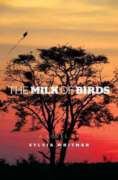
When a nonprofit organization called Save the Girls pairs a fourteen-year-old Sudanese refugee with an American teenager from Richmond, Virginia, the pen pals teach each other compassion and share a bond that bridges two continents.
Featured in Volume VI, Issue 1 of WOW Review.
A Hare in the Elephant’s Trunk
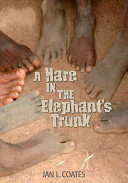
In the little village of Duk Padiet in southern Sudan, a boy named Jacob Deng thrives on the love of his mother, the companionship of his sisters, the excitement of learning how to look after his uncle’s herds of cattle. The year is 1987, and suddenly in the night soldiers from the north invade the village, looting, burning, and killing. The war has arrived, and the life of Jacob will never be the same. This novel is based on the real life experiences of a Sudanese boy who, with thousands of other boys from the region, fled for his life and spent seven years walking through deserts, grasslands and forests, crossing crocodile-infested rivers, surviving life in massive refugee camps. The so-called Lost Boys of Sudan – as they were called by an American aid organization – numbered as many as 27,000, and while many died – from starvation, attacks by wild animals, drowning, or through the brutality of the military – many survived. Jacob never returned to his village, but though he was only seven years old when he had to flee, he somehow managed to live through an almost unimaginable ordeal. Throughout the seven years covered in this story, Jacob resists the temptation to join the liberation army. Steadily Jacob finds himself more and more adhering to his mother’s advice that getting an education is crucial to escaping the cycle of violence that afflicts his country. Jacob’s struggle, then, is to persist in seeking out teachers and eventually a school where his ambition to learn about the world can be met. Through it all he learns about loyalty and love for close friends who have been thrust together with him on this extraordinary journey, and also about the guiding light provided by the memory of his mother.
See the review at WOW Review, Volume 4, Issue 2
Muktar and the Camels
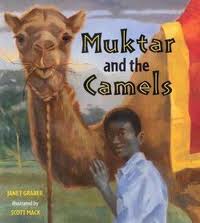
Muktar lives in an orphanage on the border of Kenya and Somalia. He daydreams about his old life with his family and especially tending to camels. One day, visitors arrive bearing books, and Muktar’s friend Ismail is excited; so is Muktar, but for a different reason—the visitors are riding on camels. Muktar quickly discovers that one of the animals is injured and realizes this is his chance to prove himself. If there is anything Muktar knows, it is camels. Through the eyes of an endearing protagonist whose love and respect for animals shines, this beautifully told story introduces young readers to another part of the world and way of life.
